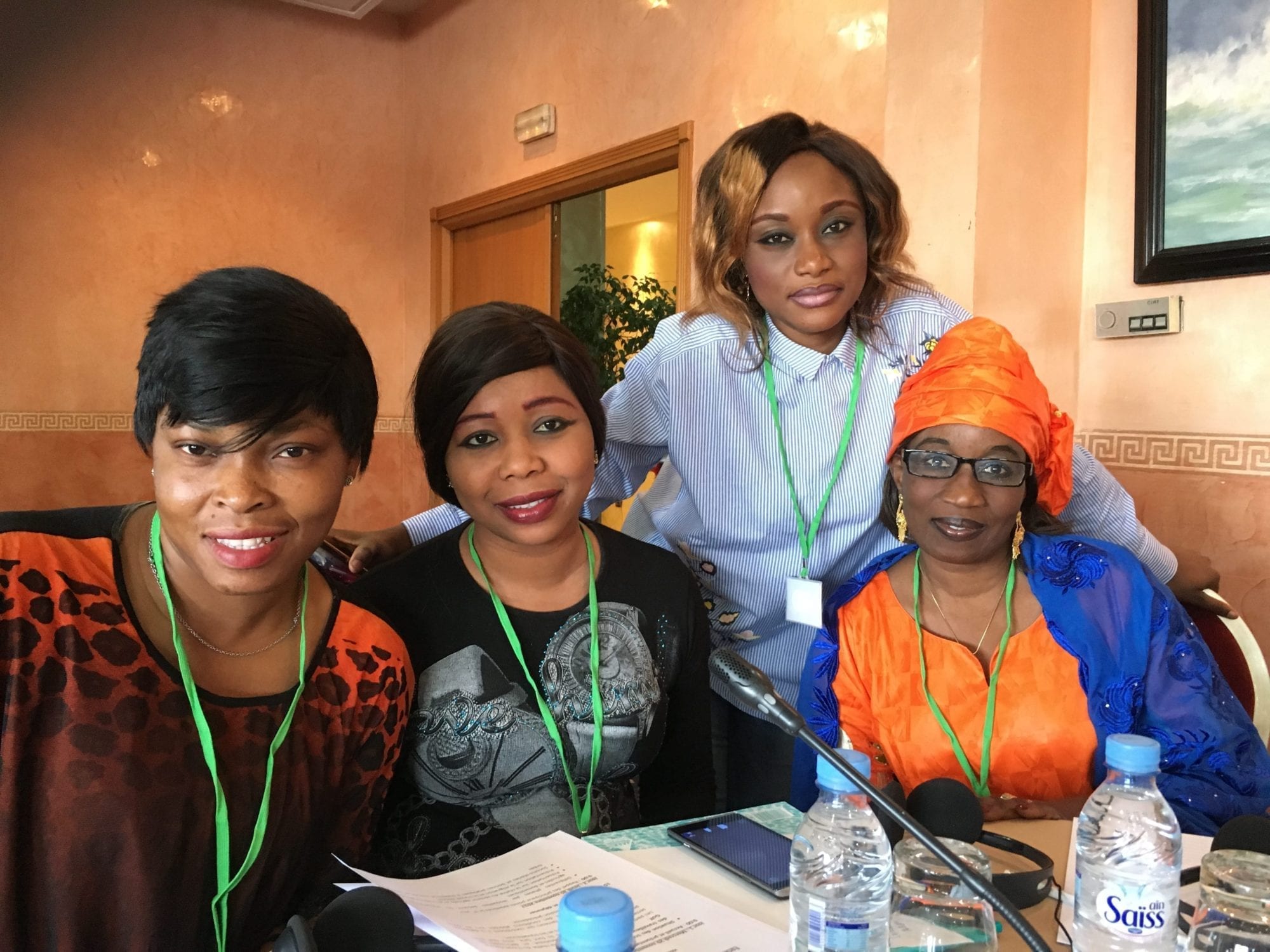
Nov 29, 2017
To promote the rights of women workers, especially women domestic workers and women farm workers, it is essential to seek solutions to build women’s capacity to defend their rights to equality, decent work and an end to violence and abuse, according to Hind Cherrouk, Solidarity Center director for North Africa as she opened a three-day forum in Casablanca, Morocco, this morning.
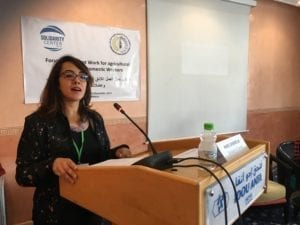
“This forum is an opportunity to build solidarity between women domestic workers and farm workers”–Hind Cherrouk, Solidarity Center program director for North Africa Credit: Solidarity Center/Tula Connell
“This forum is an opportunity to build solidarity between women domestic workers and farm workers,” says Cherrouk.
“We express our solidarity with our sisters who are migrants,” says Saida Bentahar. “We will always stretch our hands out to help them. We are going to remove the pressure of discrimination against our sisters wherever they are.” Bentahar, a Democratic Labor Confederation (CDT) women’s committee member, works to empower farm workers in Meknes El Hajeb, Morocco.
Some 30 worker rights advocates from countries that include Jordan, Kuwait, Lebanon and Morocco are meeting to discuss how such factors as gender, ethnicity and race are used to deny workers their rights and, ultimately, to build the connections and solidarity needed to take on the power structures that profit from their marginalization. The November 29–December 1 Forum on Decent Work for Agricultural Women and Domestic Workers is sponsored by the Solidarity Center and the CDT.
“If you don’t fight, nothing will happen,” says Elizabeth Tang, general secretary of the International Domestic Workers Federation. Tang, who spoke during the morning session, described how domestic workers around the world came together to fuel the 2011 passage of the International Labor Organization (ILO) Convention 189 on domestic workers, and later created IDWF.
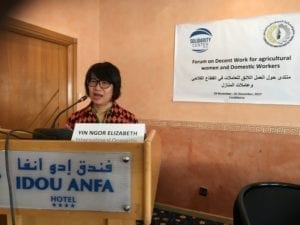
“If you don’t fight, nothing will happen”–Elizabeth Tang, IDWF secretary general Credit: Solidarity Center/Tula Connell
“If domestic workers stop fighting, then the convention will just be a nice looking paper,” says Tang. “So we decided to form a permanent union of domestic workers so we can keep fighting in unity so we can speak in one voice.” IDWF now includes 65 affiliated organizations in 53 countries.
More than half of the workers around the globe are not employed in the formal economy. Yet most informal economy workers, such as those cleaning houses and toiling on farms, have little access to decent work—which includes family-supporting wages, safe workplaces and social protections like paid time off and pensions. Decent work is one of the United Nation’s sustainable development goals, a series of targets the UN hopes to achieve by 2030.
Representing a range of unions and associations assisting workers throughout the Middle East and North Africa, participants described the challenges they face as domestic workers and agricultural workers and how, as worker rights activists, they are facilitating efforts through their organizations to achieve decent work.
Isolated in Homes, Domestic Workers Vulnerable to Abuse
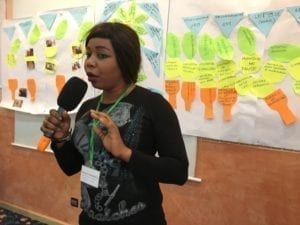
Camara Hassanatou, a domestic worker in Morocco, described how her employer forced her to work without rest. Credit: Solidarity Center/Tula Connell
Of the more than 150 million migrant workers in the world, 11.5 million are migrant domestic workers. Primarily women, domestic workers provide essential support to families, cleaning homes, cooking meals and taking care of children. Yet their isolation makes them especially vulnerable to abuse and exploitation.
“I asked my employer how long I will work,” says Camara Hassanatou, an African migrant worker in Morocco. “ ‘You will work as long as I tell you,’ she said.” Hassanatou accepted the job because she needed to support herself. Yet she received no time off, even when she was ill.
Now an activist with the Coalition of Migrant Workers in Morocco (CTMM), Hassanatou joined participants in small group discussions in which domestic workers and farm workers shared their challenges. The women discussed how migrant domestic workers often are recruited by labor brokers who lie to them about the wages and working conditions in destination countries. After they are arrive in another country, their passports and mobile phones often are taken, trapping them in employment situations where they often face physical and sexual abuse, while forced to work long hours with no time off.
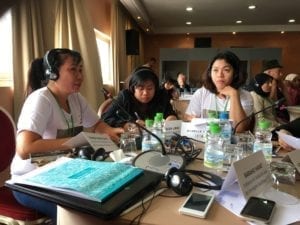
Former domestic workers from the Philippines were trafficked to Morocco and now are part of the Instance of Solidarity with Asian Workers. Credit: Solidarity Center/Tula Connell
Romaric Hocine, a member of the CTMM, which was formed in 2013, outlined how the organization works to educate migrant domestic workers about their rights. Under a recent legalization campaign by Morocco, migrant workers who have been employed for five years in the country, among other criteria, were eligible for amnesty if they applied in 2014 and 2015 and renewed in 2016. CTMM activists reached out to workers across the country to enable them to get formalize their status and attain basic rights.
Leadership training is central to the coalition’s work: “It is essential to develop leadership among migrant workers so they can defend their own rights,” he says.
From Kuwait, where two-thirds of its population is comprised of migrant workers, Mai al Tararwah, a lawyer with the Humanitarian Foundation for Legal Aid, described how a team of lawyers works to assist domestic workers and other migrants with legal support and vocational training. Farah Abdullah from the National Federation of Employees’ and Workers’ Unions in Lebanon (FENASOL) discussed the union’s objectives, which include creating “an independent structure for migrant domestic workers” in that country, where an estimated 250,000 migrant labor as domestic workers.
Farm Workers ‘Treated Like Slaves’
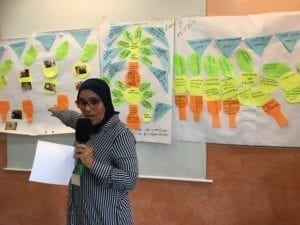
“Trade unions can reverse the factors that undermine vulnerable workers in society”–Saida Bentahar, a CDT women’s committee member Credit: Solidarity Center/Tula Connell
Many workers on agro-industrial complexes are seasonal employees and, like domestic workers in many countries around the world, they are not covered by national labor laws guaranteeing minimum wages and social protections like pensions and paid time off.
Rural women now contribute half of the world’s food and women in developing countries generate between 60 percent and 80 percent of the labor needed to produce food crops in developing countries.
Yet women working in agriculture “are being dismissed without pay, without severance, without justification with the stroke of the employer’s hand,” says Bentahar. “If they feel that the margins do not add up, employers will quickly lay off of women workers.”
Globalization has strengthened the negotiating hand of corporations at the head of supply chains. Faced with pressure to maximize profits, factory and farm managers typically pass on the costs and risks to the weakest links in the chain: the workers they employ.
Participants agreed that although domestic workers and farm workers may face different challenges, the common thread uniting their struggles is a lack of worker rights. But as Bentahar pointed out, unions provide a key path forward for many workers.
“Trade unions can reverse the factors that undermine vulnerable workers in society,” she says. “Our capital is our ablility to put pressure on our governments. We’d like your governments to put pressure on our governments to create momentum.”
“Things are changing,” says Tang. “You don’t have to look very far. Just look at yourselves.
“Together, we will make change.”
Stop back tomorrow for more coverage of the Forum on Decent Work for Agricultural Women and Domestic Workers.

Nov 20, 2017
A group of armed civilians calling themselves the “Tonalapa Community Police,” attacked striking workers at the Media Luna gold mine in Mexico on November 18, killing two workers. The two men killed were brothers, Víctor and Marcelino Sahuanitla Peña.
Workers at the Cocula, Guerrero, gold mine went on strike earlier this month after their employer recognized the Confederation of Workers of Mexico (CTM) union, a labor organization with a history of acting as “protection union” by assisting employers in blocking independent unionization efforts. The independent mineworkers’ union, SNTMMSSRM (Los Mineros), had filed for a union election on October 13.
On November 16 and 17, union leaders and the employer negotiated a peaceful resolution which called for the withdrawal of armed security forces and an expedited union representation election. The talks came after scores of armed police forces arrived at the mine, taking over the site on November 13.
“This is an outrageous and unacceptable attack on freedom of association and fundamental human rights,” says Solidarity Center Executive Director Shawna Bader-Blau. “The perpetrators must be found and held accountable.
“We stand with Los Mineros and workers everywhere who seek to peacefully form unions of their choosing,” she says.
Workers say an army squadron detained the attackers, some of whom they identified as CTM leaders, but immediately released them. The government has now sent in armed security forces.
In a statement, the United Steelworkers in Canada urged the Canadian government to “intervene with Mexican authorities and the company to recognize the basic rights of Mexican workers and prevent further violence.”
Canada-based Torex Gold Resources owns the Media Luna mine.
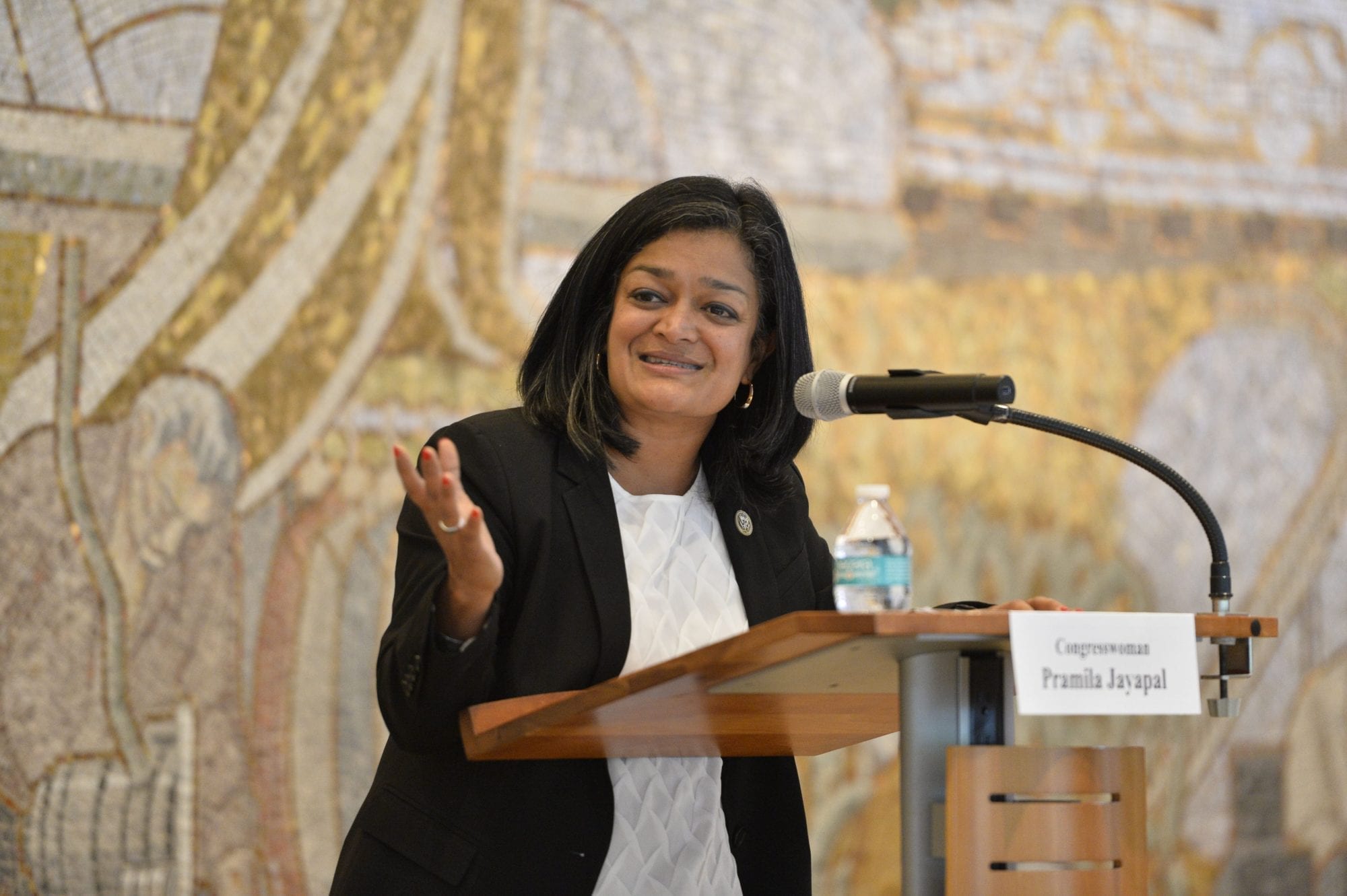
Nov 15, 2017
“Informal workers are organizing and they will organize as long as there is injustice and oppression,” says Sue Schurman, distinguished professor of Labor Studies and Employment Relations at Rutgers University.
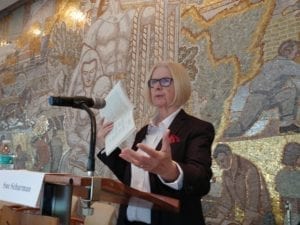
Sue Schurman, distinguished professor of Labor Studies and Employment Relations at Rutgers University, opened the Solidarity Center book launch. Credit: Solidarity Center/Tula Connell
Opening a Solidarity Center book launch and panel discussions on Informal Workers and Collective Action: A Global Perspective this morning, Schurman also cautioned that unless unions focus on the issues unique to empowering workers who have no direct employer, workers in the informal economy will organize to improve their rights “with or without the existing trade union movement.”
Hosted by the AFL-CIO, the event launched the Solidarity Center daylong 20th Anniversary Celebration in Washington, D.C., which will culminate tonight with a festive event honoring U.S. Sen. Sherrod Brown and the Colombian and Honduran labor movements. Rep. Karen Bass and AFL-CIO Secretary-Treasurer Liz Shuler will host.
Edited by Schurman, Adrienne E. Eaton and Martha A. Chen, Informal Workers collects case studies from union campaigns in such countries as Brazil, Cambodia and Colombia, bringing together in one volume a compendium of academic field research and concrete grassroots examples. The book was produced by Rutgers and WIEGO with support from the Solidarity Center.
Highlighting the event, U.S. Rep. Pramila Jayapal, the first Indian-American woman in Congress, energized participants with an impassioned call to action.
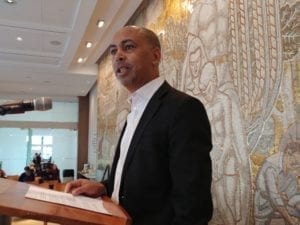
AFL-CIO Executive Vice President Tefere Gebre opened the Solidarity Center book launch on informal workers. Credit: Solidarity Center/Tula Connell
“This is about people standing up around the world and making it clear we have a very different vision,” she says. “It is about more jobs and better jobs for workers all over the world and that is the work of the Solidarity Center that we are grateful for.
“You are the ones who give me hope, working in countries around the globe in countries where organizing unions is sometimes life and death.”
“The work of the Solidarity Center around the world is very personal,” says AFL-CIO Executive Vice President Tefere Gebre, who addressed the opening session. “I was a refugee and dedicated my life to workers all across this country and world in support of their fights.”
A Broader, More Inclusive Labor Movement
Building a broader and inclusive labor movement by recognizing workers’ intersectionality is essential for unions to organize going forward, according to panelists.
“We can’t organize on the basis of class, or ethnicity, or gender—we must think about multiple identities,” says Janice Fine, associate professor of Labor Studies and Employment Relations, at Rutgers University.
Fine spoke on “Perspectives on Fighting for Social and Economic Justice for All,” the first of three panels.
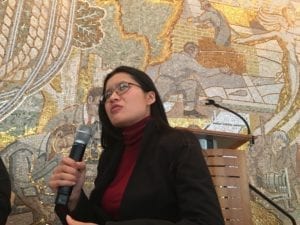
Mary Evans from Rutgers discussed how female Cambodia beer sellers improved their status as women in their communities by joining together to better their workplaces. Credit: Solidarity Center/Tula Connell
In Cambodia, where women beer sellers launched a grassroots social justice movement to improve their working conditions, and ultimately joined with unions, women have made tremendous progress in improving their status at work and in their communities, says Mary Evans, Labor Studies professor at Rutgers University.
“Beer worker women wanted dignity at work. There have been huge strides for women in Cambodia” where women have little status, she says.
Speaking about the need for unions to engage in “intersectional” organizing—inclusive, cross identity movement building, AFL-CIO International Director Cathy Feingold says, “ We need to build a campaign from the roots up, not at the place where we get stuck.
“Solidarity is multi-dimensional and horizontal,” she says. “We have to be saying, ‘I look you in the eye,’ not ‘I look down on you.’ ”
Speaking on the second panel, “The Impacts of Successful Organizing on Communities, Societies and Countries,” Evangelina Argüeta Chinchilla, National Coordinator at the General Workers Central (CGT) union confederation, described some of the challenges in organizing garment workers and negotiating bargaining agreements.
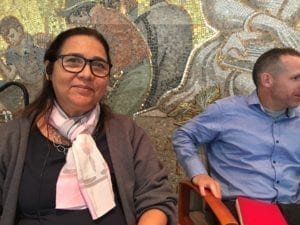
“Trade unions have been critical to the fight we are in”—Evangelina Argüeta Chinchilla, national coordinator at the General Workers Central (CGT) union confederation Credit: Solidarity Center/Tula Connell
“Trade unions have been critical to this fight we are in,” she says. “We have really been intentional about the unions being on the sideline in this struggle … and stand up to government and corporations and be the voice for the workers in this industry.” But the unions have not worked alone, she says. By partnering with women’s advocacy groups and anti-violence networks, unions have broadened their knowledge and expanded their allies in Honduras and around the world.
Argüeta and several Honduran garment workers will accept the honor award on behalf of the Honduran union movement at tonight’s 20th Anniversary Celebration.
Social Movement Unionism
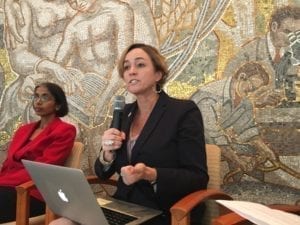
Solidarity Center Executive Director Shawna Bader-Blau described how Tunisian unions joined a countrywide movement for social justice. Credit: Solidarity Center/Tula Connel
Highlighting the Tunisian labor movement’s role in the 2011 Arab spring, Solidarity Center Executive Director Shawna Bader-Blau said unions initially played a supporting role to the grassroots opposition to dictator Zine El Abidine Ben Ali.
Later, the labor movement made a choice to shift its political support to the people, and by calling a national strike in which 100,000 union members took to the streets, the union movement facilitated the election of a democratic government.
“What the labor movement did was recognize itself in this movement. Bread, freedom and liberty—that’s what the labor movement is about.”
In Buenaventura, Colombia, where port workers were paid low wages with no social protections after their jobs were subcontracted, workers went on strike despite a law prohibiting them from doing so because they were not formally employed, says Dan Hawkins, research director at the Escuela Nacional Sindical in Colombia.
The strike, says Hawkins, empowered the Afro-Colombian community because “it symbolized to people in a racially discriminated city where all people in power are white or mestizo, the importance of port workers standing up for their rights.”
In the Dominican Republic, where informal economy workers have no legal right to form unions, domestic workers joined together in an association to work for their rights, says Fine, who shared the results of her case study from Informal Workers. The efforts of the primarily Haitian women workers were key to moving 2011 passage of International Labor Organization Convention 189 on domestic worker rights, expanding the possibility of decent work to domestic workers around the world.
Summing up the conference discussion, Jayapal says, “Ultimately we need to recognize we need to help workers around the world. We need to take on racism and sexism and xenophobia because that’s what will make the union movement strong.”
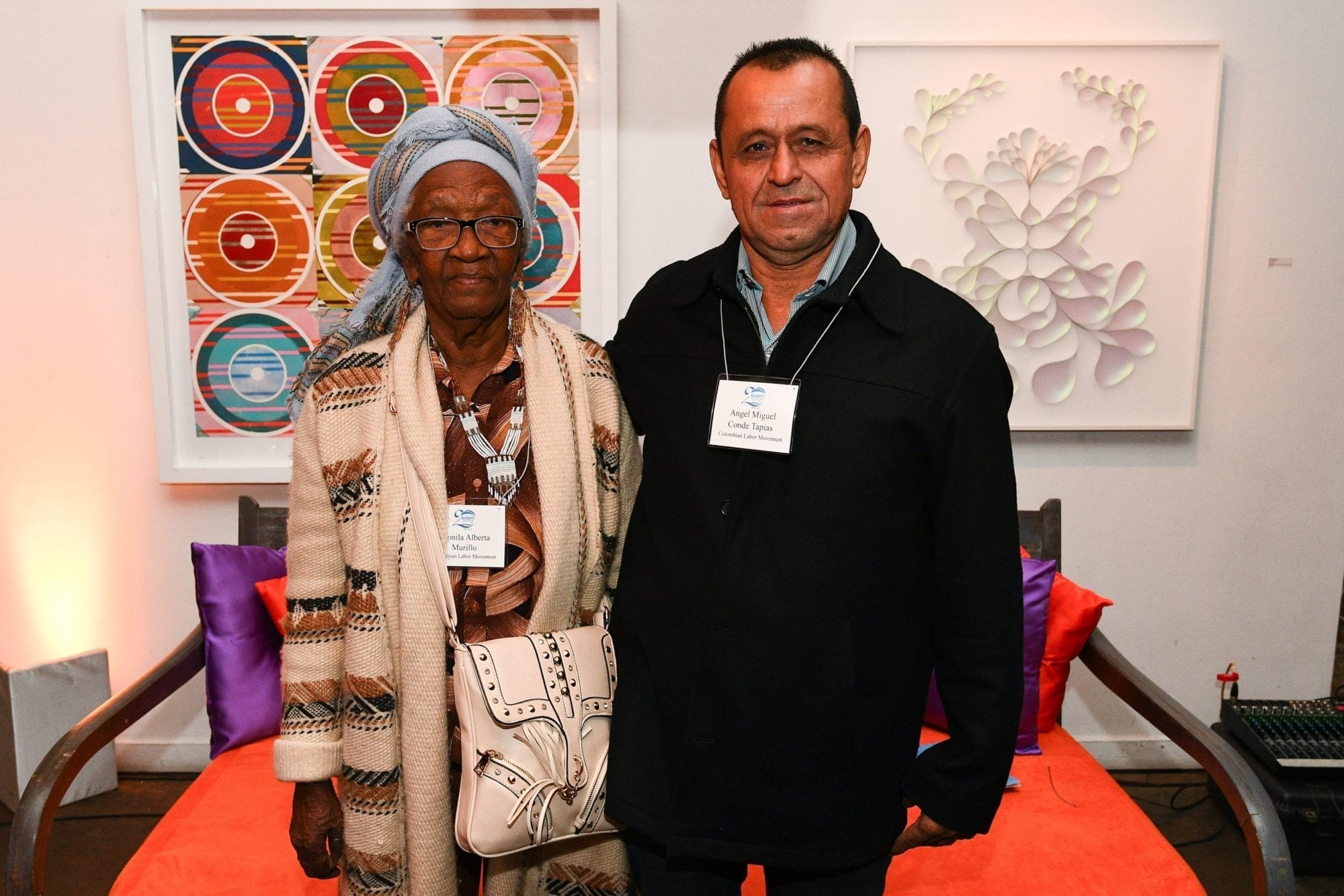
Nov 14, 2017
Leonila Murillo, a decades-long leader in Buenaventura, Colombia, and Angel Miguel Conde Tapia, a Colombian palm oil worker and union vice president are among the extraordinary leaders and activists who will be honored for their dedication to improving the lives of workers and their communities during the Solidarity Center 20th Anniversary celebration in Washington, D.C., tomorrow.
The evening event features AFL-CIO Secretary-Treasurer Liz Shuler and also will honor U.S. Sen. Sherrod Brown for his leadership to protect worker rights, and the Honduran labor movement for its dedication to achieving rights for workers in difficult and sometimes deadly conditions. Special guest U.S. Rep. Karen Bass will deliver remarks. (There’s still time to sponsor the event or buy tickets to attend!)
The day begins with a launch of the Solidarity Center-supported book, Informal Workers and Collective Action: A Global Perspective, and panel discussions featuring U.S. Rep. Pramila Jayapal and international worker rights activists. (Find out more about the free book event and RSVP here.)
On the Frontlines of Social Justice Unionism
Murillo, 81, has long been on frontlines to achieve social justice in her community. Most recently the mother of six children, 13 grandchildren and 14 great-grandchildren was among tens of thousands of peaceful protesters in Buenaventura who took to the streets for 22 days in May demanding peace and dignity after years of neglect by leaders in Bogota, the capital. Many of the port city’s 400,000 predominately Afro-Colombian inhabitants live in abject poverty without access to proper hospitals, schools, roads and other basic services.
On June 6, the government agreed to invest more than $500 million in the long-neglected city over the next decade. Buenaventura’s thriving port accounts for 60 percent of the country’s maritime trade and in 2014, generated $2 billion in tax revenue. Only 3 percent of that revenue is reinvested in the city, where residents are primarily Afro-Colombians.
Murillo, who leads 1,000 women in the organization Women in Black of the Pacific Route, and served as president of her neighborhood district’s Council of Community Action, also has worked for 29 years as a child caregiver, known as “community mother.” She was among leaders of the struggle by community mothers to gain pension benefits, going on strike in 2013 and winning promises from the government to give the women, who work as “independent contractors” the same benefits as directly employed caregivers. So far, the community mothers have seen no pension benefits.
“That’s why I’m here [in the United States]—to denounce that, to say that there are women who are dying and never getting their pensions,” Murillo says, speaking through a translator.
Palm Oil Workers Stand Strong in Face of Danger
As a palm oil worker in Colombia, Conde Tapia, hacks through the fruit with a machete, cleans branches and performs field maintenance on one of the country’s large agricultural plantations. A 29-year union member and now vice president of the palm oil union SINTRAINAGRO, he has sacrificed much to improve working conditions. Conde Tapia says he nearly lost his life when a gunman targeted him for his union work. Luckily, the gun pointed at him did not fire. But Conde Tapia has sent some of his children out of the area for their safety. Other union activists have had similar experiences.
Like the Buenaventura community, where workers say unfair job subcontracting is taking away family sustaining wages and social protections, palm oil workers in Colombia are regularly hired as subcontractors, enabling employers to avoid paying living wages and benefits granted in union contracts. In 2011, 15,000 subcontracted palm oil workers went on strike, and union leaders from four palm companies successfully initiated a process by which workers would gain formal employment status—success that vastly increased union affiliation.
In recognizing the incredible sacrifices of Murillo and Conde Tapia, the Solidarity Center honors the struggles of all Colombians in Buenaventura and across palm oil plantations who strive to improve their lives and their families’ future.
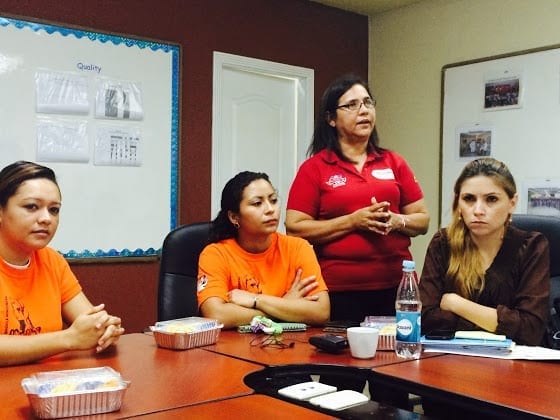
Nov 9, 2017
In Honduras, union leaders are on their way to successfully negotiating eight collective bargaining agreements covering 21,000 garment workers who have joined unions in the past few years. Contracts negotiated so far include 23 percent wage increases, free transportation to and from work, free lunch, additional severance pay for workers recovering from ergonomic-related illnesses, and educational funds for workers and their children.
Five of those agreements will be first-ever pacts for 17,350 workers, says Evangelina Argüeta Chinchilla, coordinator of organizing maquila workers in the northern Choloma region for the General Workers Central (CGT) union confederation.
Argüeta Chinchilla, whose efforts to improve factory workplaces and whose training among women garment workers is enabling them to take leading roles in their unions and communities, will be honored along with the Honduran union movement November 15 at the Solidarity Center 20th Anniversary celebration in Washington, D.C.
The evening event features AFL-CIO Secretary-Treasurer Liz Shuler and also will honor U.S. Sen. Sherrod Brown for his leadership to protect worker rights and the brave Colombian union and community activists for their frontline-efforts to achieve social justice in their country. And special guest U.S. Rep. Karen Bass will deliver remarks. (There’s still time to sponsor the event or buy tickets to attend!)
The day begins with a launch of the Solidarity Center-support book, Informal Workers and Collective Action: A Global Perspective, and panel discussions featuring U.S. Rep. Pramila Jayapal and international worker rights activists. (Find out more about the free book event and RSVP here.)
Honduran Unions ‘Persevere on Behalf of Workers and Their Families’
In a country where in recent years union leaders have been harassed, attacked and even murdered, and where employers utilize hardball tactics to prevent workers from forming unions and bargaining contracts, the stunning success of the garment workers in achieving fundamental workplace rights is a “testament to the determination of the Honduran union movement to persevere on behalf of workers and their families,” says Solidarity Center Executive Director Shawna Bader-Blau. “Together, they are helping to ensure that workers have living wages, just and fair workplaces and the opportunity to improve the future of their children.”
Argüeta Chinchilla is emblematic of these dedicated activists. She began work in a maquila at age 15, where she toiled for nine years and was a founder of the union at her factory before becoming a full-time organizer for the CGT. With Argueta’s leadership, Honduran garment-sector unions have negotiated historic worker rights agreements with two major U.S. clothing brands, Fruit of the Loom (2009) and Nike (2010), that laid the groundwork for successive organizing and collective bargaining achievements.
She and other women unionists hold leadership trainings with assistance from women’s rights organizations and the Solidarity Center. Argüeta Chinchilla hopes to see women “exercising power proportional to the numbers we represent in the world, in the labor movement.”
Empowered women now ensure their concerns are reflected in bargaining agreements. Some of the contracts garment workers have negotiated so far grant women who have just given birth additional paid leave beyond the 12-week maternity leave they receive under Honduran law.
“This is important, because a lot of times women workers must resign because they don’t have anyone to take care of their baby, especially in the early weeks, and this will help them get through that period,” says Argüeta Chinchilla, speaking through a translator.
Expanding Democracy Through the Freedom to Form Unions
International solidarity with Honduran workers has been key to furthering their efforts to achieve decent jobs. In November 2009, Russell Athletic agreed to rehire 1,200 workers in Honduras who lost their jobs when the company closed the factory in an attempt to bust the union, after the union—with support from the Solidarity Center and the United Students Against Sweatshops—convinced 110 U.S. universities to cut their apparel contracts with Russell.
Since then, says Argüeta Chinchilla, “it is very evident that significant protections have been made—workers are more educated about their rights, there is more respect for freedom of association and collective bargaining, and improvements such as health and safety for workers.
“There is always the fear of losing your job, but less now than what happened in past.”
Earlier this year, a four-year campaign by Honduran labor unions to improve workplaces and strengthen the rights of workers culminated with the Honduran National Congress approving a new labor inspection law. The law promotes, monitors and is designed to ensure that workplace standards, safety and health provisions, and social security requirements are upheld. It includes financial penalties for violations of worker rights, including the right to form unions.
Argüeta Chinchilla knows that such success begins through empowering workers, especially women workers, to take active roles in their unions.
“The internal democracy of unions has improved,” says Argüeta Chinchilla. “Many more women are active in union leadership, and this has translated into civil society: Workers are more participative in democracy and government and the country in general.”
















